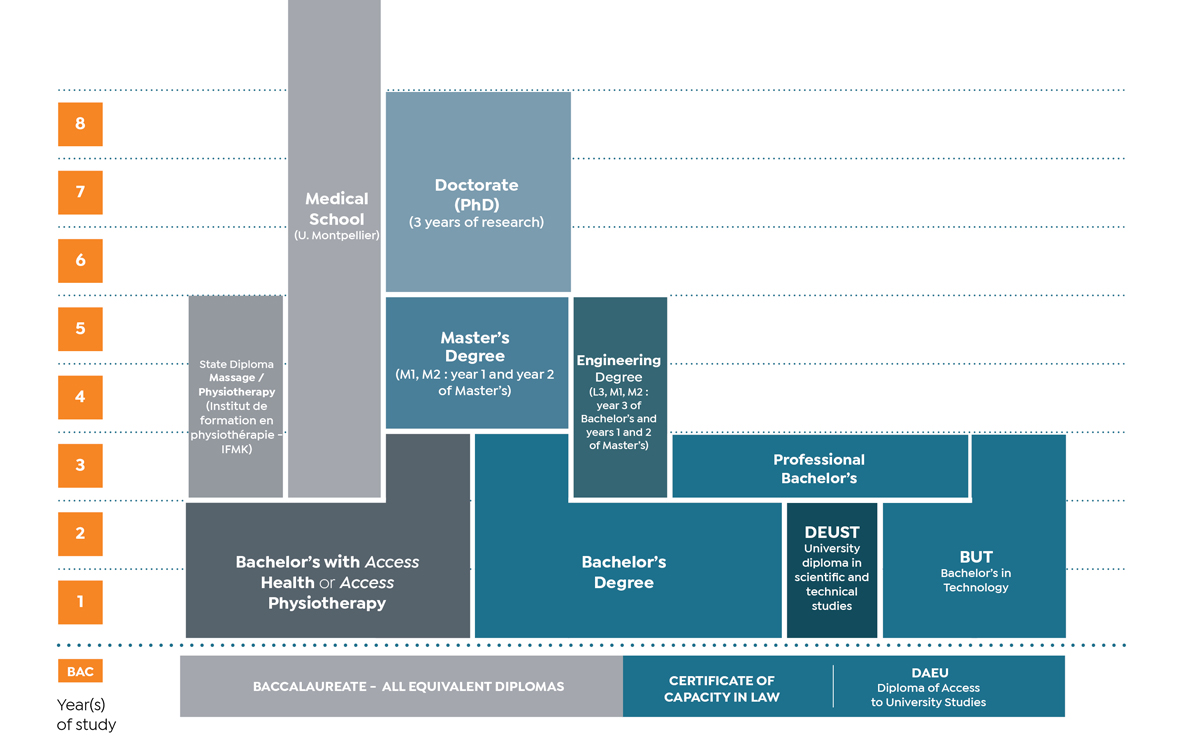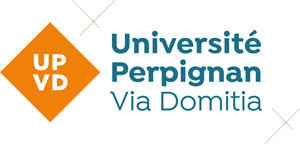Understanding your university pathway
The LMD system
The Université de Perpignan Via Domitia applies the European LMD system, which equates to Undergraduate-Master-PhD: Undergraduate - Licence (L) - Baccalaureate +3 years Master (M) - Baccalaureate +5 years PhD - Doctorate (D) - Baccalaureate +8 years

- BUT, Licence or DEUST?
-
BUT
The BUT (Bachelor universitaire de technologie) offers a 3-year vocational course, subject to selection criteria. The BUT gives access to employment at Baccalaureate +2 years or Baccalaureate +3 years level, with a professional degree in the third year.
The BUTs at UPVD
Licence (Bachelors)
The undergraduate degree (Licence) is less specialised and allows students to follow the traditional route: undergraduate degree (Baccalaureate +3 years), master's degree (Baccalaureate +5 years), PhD (Baccalaureate +8 years). The Professional Degree (Licence Professionnelle) is a one-year course, corresponding to the 3rd year of an undergraduate degree.
Undergraduate degrees at UPVD
DEUSTThe DEUST (Diplôme d’études universitaires scientifiques et techniques) is aimed at immediate professional integration.
DEUST at UPVD
- Student Status
-
In France, anyone enrolled at a higher education establishment has student status. This status entitles you to reduced rates on a wide range of everyday services: transport, catering, leisure activities, sport etc.
When you arrive at the Université de Perpignan Via Domitia, you will be given a student card. Don't lose it! This card is proof of your student status. You will be asked for it regularly throughout your stay.
How do you get your student card?
If your application has been validated, your student card will be given to you at the start of the academic year by your course's administrative office. If your card is lost, stolen or destroyed, a duplicate can be issued for a fee of €6 (reissue fee) on presentation of proof of identity.
Everything you need to know before arriving in France: https://www.etudiant.gouv.fr/fr/node/2063
- Studying in a specific context
-
It's possible to study while balancing sporting, artistic or disability-related constraints.
The EBPP Office (Étudiants à Besoins Pédagogiques Particuliers - Students with Special Educational Needs) provides support to students with specific needs.
There are several support solutions available, including adjustments to teaching or exams, tutoring, note-taking, loan of adapted equipment, exam assistants etc.
Accredited courses at the UPVD
Lifelong professional training (FTLV) is comprised two components : an initial training component and a continuing education component.
Initial training concerns students who spend the majority of their time focused on their studies.
Continuing professional training, or continuing education, concerns adults who want to update their knowledge and skills with respect to their professional development and/or to gain the skills and courses necessary to progress in their career.
The UPVD offers a diverse range of training opportunities for everyone, depending on their experience, education level and status.
- National diplomas
-
In accordance with article D613-4 of France’s Education Code, the Ministry of Higher Education and Research accredited the following national diplomas (by order of 8 June 2021) in all of the major academic fields:
DAEU, Certificate of Capacity in Law (Capacité en droit), DEUST, Bachelor’s , dont les licences Access Health (Accès Santé), Professional Bachelor’s, Bachelor’s in Technology (BUT), Master, Engineering Degree, Doctorat (PhD). - University diplomas (DU)
-
In accordance with the provisions of article D613-2 of the French Education Code, the University of Perpignan offers short, specialized courses known as University Diplomas (DU), which do not generally have a national accreditation. Accessible at different levels of study, they can be added to a traditional university course, such as the DU in Languages. Aimed at international students with a desire to enter within the university system, the objective of the CUEF's DUs is to prepare them linguistically, methodologically and culturally. The other DU programs are mainly aimed at people who are already employed and who would like to specialize in a specific field or skillset, go back to school or change direction, or those seeking to use their personal training accounts (CPF) (employees, self-employed people, the self-employed, jobseekers, etc.).
- Certifications
-
The UPVD is a certification center for :
DELF-DALF : Diploma in the French Language and Diploma in Advanced French Language TCF : French Knowledge Test TEF Canada: French Evaluation Test (Canada)
French and French as a Foreign Language (FLE):
TOEIC: Test of English for International Communication CLES: Certificat de compétences en Langues de l'Enseignement Supérieur (Certificate of Language Skills for Higher Education). It provides reliable proof of a candidate's level in English and Spanish.
Foreign languages :
Digital skillsPIX: Digital Skills Certificate
- Validation of prior learning
-
The principle of validation is set out in the French Labour Code: "any person engaged in working life is entitled to have the benefits of his or her experience, in particular professional experience or experience related to the exercise of trade union responsibilities, validated".
There are three types of validation:
VAE : VAE, or Validation des Acquis de l'Expérience, enables anyone to have their experience recognised through professional certification (diploma, professional title, CQP, etc.). VES : Validation of higher education studies (VES) enables you to obtain all or part of a diploma by recognising your studies in France (in a course not leading to a state diploma) or abroad. VAP :Validation of professional experience (VAP 85) enables you to gain direct access to a university course without having the required diploma, by having your professional experience (whether salaried or not), the training you have taken or the personal experience you have acquired outside the training system validated.
Practical information
Office for Students with Special Educational Needs (EBPP)
Building B, ground floor - Campus du Moulin-à-Vent
cellule.ebpp@univ-perp.fr
Elite Sports Students and Talented Artists
mk.salvador@univ-perp.fr
Tel: +33 (0)4 68 66 17 07
Students with Disabilities (BAEH)
baeh@univ-perp.fr
+33 (0)4 30 19 81 40


